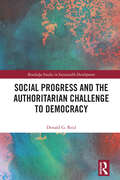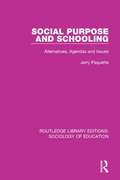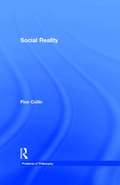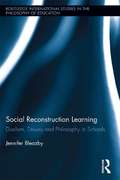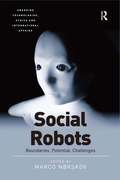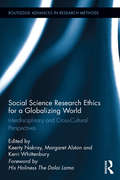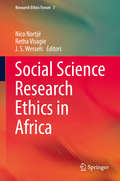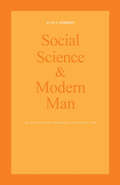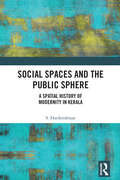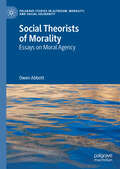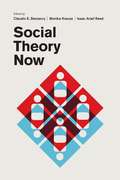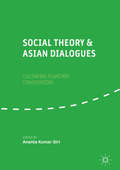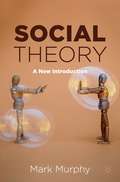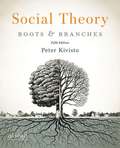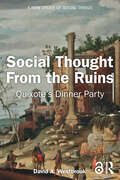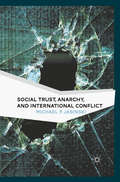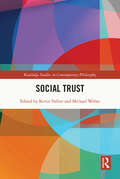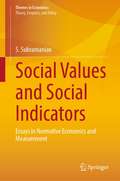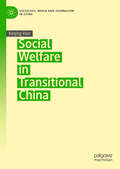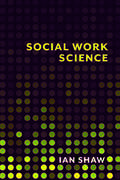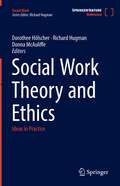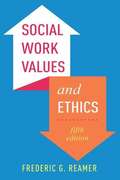- Table View
- List View
Social Progress and the Authoritarian Challenge to Democracy (Routledge Studies in Sustainable Development)
by Donald G. ReidSocial Progress and the Authoritarian Challenge to Democracy examines the authoritarian challenge to present-day democracy through a framing of social progress theory and the idea of the social contract. Building on the author’s previous work, this book discusses whether social progress is linear and on a continual upward trajectory to human betterment, or if there are peaks and troughs along the way. More importantly, it questions that, if social progress exists, is it compatible with social and environmental sustainability? At the outset the book introduces the concepts of social contract theory and the idea of human social progress, long considered to be settled conditions, now ripe for further examination. Each chapter carefully analyses the contemporary struggle between democracy and authoritarianism, using examples from the USA as a foundation to discuss and compare democracies from around the world encountering the pressures of rising authoritarianism, including anti-immigration, xenophobia and anti-institutionalism. It argues that if the climate crisis is to be urgently addressed as required, the rise in authoritarian thinking, with its focus on maintaining power and the creation of individual wealth, presents a challenge to both our societal foundations and environmental sustainability. Highlighting and analysing topics of critical importance to today’s society, this book will have widespread appeal to academics, researchers and postgraduate students throughout the social sciences including sociology, political science, philosophy, environmental sustainability and development studies.
Social Purpose and Schooling: Alternatives, Agendas and Issues (Routledge Library Editions: Sociology of Education #43)
by Jerry PaquetteFirst published in 1991, this work critically analyses the competing claims about alternative arrangements for schooling. It does so in light of major popularly understood agendas for social and political purpose, and of the troubled and much less clearly understood assumptions and issues behind them. The book examines closely four generic types of arrangements for schooling in light of a comprehensive framework for understanding the publicness or privateness of schools, and the relationships between social and educational purpose. The book poses key questions about the meaning and purpose of schooling in the rapidly evolving social, demographic and technological realities of the time. It also probes fundamental assumptions, values and beliefs behind educational and public policy-making. In doing so, it offers a way to make sense of unorthodox arrangements for the provision and funding of schools.
Social Reality (Problems of Philosophy)
by Finn CollinSocial reality is currently a hotly debated topic not only in social science, but also in philosophy and the other humanities. Finn Collin, in this concise guide, asks if social reality is created by the way social agents conceive of it? Is there a difference between the kind of existence attributed to social and to physical facts - do physical facts enjoy a more independent existence? To what extent is social reality a matter of social convention. Finn Collin considers a number of traditional doctrines which support the constructivist position that social reality is generated by our 'interpretation' of it. He also examines the way social facts are contingent upon the meaning invested in them by social agents; the nature of social convention; the status of social facts as symbolic; the ways in which socially shared language is claimed to generate the reality described, as well as the limitations of some of the over-ambitious popular arguments for social constructivism.
Social Reconstruction Learning: Dualism, Dewey and Philosophy in Schools (Routledge International Studies in the Philosophy of Education #29)
by Jennifer BleazbyThis volume argues that educational problems have their basis in an ideology of binary opposites often referred to as dualism, which is deeply embedded in all aspects of Western society and philosophy, and that it is partly because mainstream schooling incorporates dualism that it is unable to facilitate the thinking skills, dispositions and understandings necessary for autonomy, democratic citizenship and leading a meaningful life. Drawing on the philosophy of John Dewey, feminist pragmatism, Matthew Lipman’s Philosophy for Children program, and the service learning movement, Bleazby proposes an approach to schooling termed "social reconstruction learning," in which students engage in philosophical inquiries with members of their community in order to reconstruct real social problems, arguing that this pedagogy can better facilitate independent thinking, imaginativeness, emotional intelligence, autonomy, and active citizenship.
Social Robots: Boundaries, Potential, Challenges (Emerging Technologies, Ethics and International Affairs)
by Marco NørskovSocial robotics is a cutting edge research area gathering researchers and stakeholders from various disciplines and organizations. The transformational potential that these machines, in the form of, for example, caregiving, entertainment or partner robots, pose to our societies and to us as individuals seems to be limited by our technical limitations and phantasy alone. This collection contributes to the field of social robotics by exploring its boundaries from a philosophically informed standpoint. It constructively outlines central potentials and challenges and thereby also provides a stable fundament for further research of empirical, qualitative or methodological nature.
Social Science As Moral Inquiry
by Robert N. Bellah Paul Rabinow William Sullivan Norma HaanThe papers in this volume arise out of a sense of unease shared in greater or lesser degree by all the contributors. The unease concerns first of all the relation of social science as presently practiced to the realm of ethics. "Value neutrality," itself a term far from clear, now seems without foundation as a guide in this area, but no forceful alternative has yet gathered a consensus. But the unease, among a number of the contributors, goes deeper than a worry about the moral meaning of social science. It includes a worry about the moral meaning of modern society itself. Social science and modern society were born together and their fates are deeply intertwined.
Social Science Research Ethics for a Globalizing World: Interdisciplinary and Cross-Cultural Perspectives (Routledge Advances in Research Methods #16)
by Kerri Whittenbury Margaret Alston Keerty NakrayResearch in the humanities and social sciences thrives on critical reflections that unfold with each research project, not only in terms of knowledge created, but in whether chosen methodologies served their purpose. Ethics forms the bulwark of any social science research methodology and it requires continuous engagement and reengagement for the greater advancement of knowledge. Each chapter in this book will draw from the empirical knowledge created through intensive fieldwork and provide an account of ethical questions faced by the contributors, placing them in the context of contemporary debates surrounding the theory and practice of ethics. The chapters have been thematically organized into five sections: Feminist Ethics: Cross-Cultural Reflections and Its Implications for Change; Researching Physical and Sexual Violence in Non-Academic Settings: A Need for Ethical Protocols; Human Agency, Reciprocity, Participation and Activism: Meanings for Social Science Research Ethics; Emotions, Conflict and Dangerous Fields: Issues of “Safety” and Reflective Research; and Social Science Education: Training in Ethics or “Ethical Training” and “Ethical Publicizing." This inter-disciplinary volume will interest students and researchers in academic and non-academic settings in core disciplines of Anthropology, Sociology, Law, Political Science, International Relations, Geography, or inter-disciplinary degrees in Development Studies, Health Studies, Public Health Policy, Social Policy, Health Policy, Psychology, Peace and Conflict studies, and Gender Studies. The book features a foreword by His Holiness The Dalai Lama.
Social Science Research Ethics in Africa (Research Ethics Forum #7)
by Nico Nortjé Retha Visagie J. S. WesselsThis book gives a voice to debates surrounding social science research ethics in Africa and brings them together in a coherent form to assist readers in being at the forefront of the discussions. The book gives an overview of the importance of research ethics in social sciences, as well as articulating the African influence on the subject matter. Subsequently it looks into specific frameworks and tools that researchers can apply in the process of doing research. Last but not least it also takes an in-depth look at traditional ethical issues pertaining to research in social sciences, through the lens of the African continent. This is the first book on social science research ethics in an African context and an indispensable resource for researchers, students, policy makers and research institutions in or interested in African research ethics.
Social Science and Modern Man: Alan B. Plaunt Memorial Lectures 1969
by Scott GordonThe main theme of these lectures is man's struggle to understand himself as a social being. The author argues that the chief inspiration for this effort, insofar as it has been successful, has been the rationalist philosophy of physical science, and that constructive social science has been based on this philosophy rather than upon theology and ethical philosophy. He goes on to discuss the major problems confronting man in his attempts to come to grips with the modern social world - problems of social and political organization, of equality and aspiration, of intellect and reason - and ends with a plea for liberalism and rationalism as the political and intellectual foundations of freedom and progress. This fascinating and thought-provoking apology for liberalism and the social scientist will be valuable reading for anyone interested in problems facing them both today.
Social Spaces and the Public Sphere: A Spatial-history of Modernity in Kerala
by S. HarikrishnanWhat can social spaces tell us about social relations in society? How do everyday social spaces like teashops, reading rooms, and libraries reify—or subvert—dominant social structures like caste and gender? These are the questions that this book explores through a study of modern Kerala. Using archival material, discourse analysis, participant observation, and personal interviews, this book traces the transformation of public spaces through the nineteenth and twentieth centuries. The volume focuses on how "modernity" has also been a struggle for access to public spaces, and non-institutional spaces like teashops, markets, public roads, temple grounds, reading rooms, and libraries have all been crucial to how political culture was shaped, and how dominant hegemonies—caste, class, or capital—have been challenged. It suggests that the secular public sphere that emerged in the last century in Kerala was a result of the constant negotiations between conflicting ideas which were put to test in these social spaces. At a time when digital spaces are fast replacing physical ones, this book is a timely reminder of the struggles that led to the emergence of secular public spaces in Kerala. It contributes to similar studies on public space that have emerged from other parts of the world over the last decades. A major contribution to understanding modern India, this book will be of interest to scholars and researchers of social history, political science, political sociology, gender studies, linguistics, and South Asian studies.
Social Theorists of Morality: Essays on Moral Agency (Palgrave Studies in Altruism, Morality, and Social Solidarity)
by Owen AbbottThis book provides an interdisciplinary series of essays on key social theorists of morality. It explores contributions to social moral theorising made by W. E. B. Du Bois, G. H. Mead, Jane Addams, Alasdair MacIntyre, Carol Gilligan, Seyla Benhabib, Kwame Anthony Appiah, and Jonathan Haidt. It thus seeks to integrate alternative voices at the “foundations” of sociological theorising about morality, while entering into dialogues with post-Enlightenment moral philosophy and contemporary moral psychology. In so doing, it engages with perspectives of pragmatism, virtue ethics, care ethics, feminist critiques, and moral foundations theory. The essays discuss key topics in social theories of morality, including moral action, socialisation, habit and reflexiveness, relationships, emotion, self, identity, racism and colonialism, universalism, and innateness. It centres crucial (but often overlooked) questions of moral power, and assesses the relationship between moral theorising and normative argument. The essays are conjoined by a running theme of moral agency—how it is constituted and how it is enacted—which orientates the book’s arguments and critiques.
Social Theory
by Alex Skinner Wolfgang Knöbl Hans Joas Hans Joas Wolfgang KnöblRising concerns among scholars about the intellectual and cultural foundations of democracy have led to a revival of interest in the American philosophical tradition of pragmatism. In this book, Hans Joas shows how pragmatism can link divergent intellectual efforts to understand the social contexts of human knowledge, individual freedom, and democratic culture. Along with pragmatism's impact on American sociology and social research from 1895 to the 1940s, Joas traces its reception by French and German traditions during this century. He explores the influences of pragmatism—often misunderstood—on Emile Durkheim's sociology of knowledge, and on German thought, with particularly enlightening references to its appropriation by Nazism and its rejection by neo-Marxism. He also explores new currents of social theory in the work of Habermas, Castoriadis, Giddens, and Alexander, fashioning a bridge between Continental thought, American philosophy, and contemporary sociology; he shows how the misapprehension and neglect of pragmatism has led to systematic deficiencies in contemporary social theory. From this skillful historical and theoretical analysis, Joas creates a powerful case for the enduring legacy of Peirce, James, Dewey, and Mead for social theorists today.
Social Theory Now
by Monika Krause Isaac Ariail Reed Claudio E. Benzecry, Isaac Ariail Reed, and Monika KrauseThe landscape of social theory has changed significantly over the three decades since the publication of Anthony Giddens and Jonathan Turner’s seminal Social Theory Today. Sociologists in the twenty-first century desperately need a new agenda centered around central questions of social theory. In Social Theory Now, Claudio E. Benzecry, Monika Krause, and Isaac Ariail Reed set a new course for sociologists, bringing together contributions from the most distinctive?sociological?traditions?in an ambitious survey of where social theory is today and where it might be going. The book?provides a strategic window onto social theory based on current research, examining trends in classical traditions and the cutting edge of more recent approaches. From distinctive theoretical positions, contributors address questions about?how social order is accomplished; the role of materiality, practice, and meaning; as well as the conditions for the knowledge of the social world. The theoretical traditions presented include cultural sociology, microsociologies, world-system theory and post-colonial theory, gender and feminism, actor network and network theory, systems theory, field theory, rational choice, poststructuralism, pragmatism, and the sociology of conventions. Each chapter introduces a tradition and presents an agenda for further theoretical development. Social Theory Now is an essential tool for sociologists. It will be central to the discussion and teaching of contemporary social theory?for years to come.
Social Theory and Asian Dialogues: Cultivating Planetary Conversations
by Ananta Kumar GiriCritically exploring the presuppositions of contemporary social theory, this collection argues for a trans-civilizational dialogue and a deepening of the universe of intellectual discourse in order to transform sociology into a truly planetary conversation on the human condition. Focusing on perspectives from Asia, notably East Asia and India, it interrogates presuppositions in contemporary critical social theory about man, culture and society, and considers central themes such as knowledge and power, knowledge and liberation. The diverse contributions tackle key questions such the globalization of social theory, identity and society in east asia, as well as issues such as biopolitics, social welfare and eurocentrism. They also examine dialogues along multiple trajectories between social theorists from the Euro-American world and from the Asian universe, such as between Kant and Gandhi, Habermas and Sri Aurobindo, the Bildung tradition in Europe and the Confucian traditions. Arguing for a global comparative engagement and cross-cultural dialogue, this is a key read for all those interested in the future of social theory in the wake of globalization and the rise of the global south.
Social Theory: A New Introduction
by Mark MurphyThis textbook delivers a new thematic introduction to social theory that explores theoretical issues in their contemporary social contexts. Each chapter is devoted to a specific thematic area, including the state, governance, the economy, civil society, culture, language, knowledge, the self, emotions, the body, and social justice. Each chapter details the key issues for debate and the relevant theories while linking those debates and theories to everyday life. Distributed throughout the chapters are focused sections on key concepts and their research applications, alongside helpful additional detail including a glossary, further suggested readings, chapter summaries, and questions for discussion. The book also provides useful information on key theoretical movements such as feminism, Marxism, and post-structuralism, as well as biographies of key theorists. As such, it reflects the breadth of social theory and its interdisciplinary nature by drawing on thinkers not just from sociology, but also from philosophy, history, literature, geography, cultural and gender studies.The book’s logical structure and clear pedagogical features make it an appealing and accessible introductory text for students new to social theory. The chapters demonstrate the relevance of social theory to everyday life, such that readers can understand and actively engage with key concepts.
Social Theory: Roots And Branches (Fifth Edition)
by Peter KivistoEdited by Peter Kivisto, this acclaimed collection of accessible primary source readings enables students to experience "firsthand" a wide range of perspectives that are shaping current sociological theory. Now in its fifth edition, Social Theory: Roots and Branches covers both classical theory (the roots) and contemporary theory (the branches) and shows how they are linked. Part One features work from such well-known classical theorists as Marx, Durkheim, Weber, and Simmel. It also presents selections by theorists outside of the discipline and from writers who are often overlooked in competing collections, including W. E. B. Du Bois, Charlotte Perkins Gilman, and Harriet Martineau. Part Two offers readings that illustrate major contemporary theoretical approaches, ending with a section on cutting-edge directions in theoretical discourse. Now featuring a revised and expanded introductory chapter, this fifth edition offers seventeen new readings, including eight by theorists who are new to this collection.
Social Thought From the Ruins: Quixote’s Dinner Party (A New Order of Social Things)
by David A. WestbrookThrough stories, conversations, and essays, this book pursues interwoven critical and philosophical inquiries into the nature of the contemporary in the North Atlantic, asking how are we to live as intellectuals, individually and in community?Social Thought From the Ruins: Quixote’s Dinner Party is the product of informal discussion and academic work done over the last two decades among an international group of social scientists. An extended critique of academic life today and the context of our own thinking, this book interrogates aspects of our modernity, with its pervasive sense of crisis and uncertainty, and the difficulty of thinking clearly about things like the state and power, data and violence. Reflecting that the United States, indeed the North Atlantic countries, seem to have entered autumn, David A. Westbrook asks what spring might be. Will the critical social sciences have anything to offer the exercise of power, or are we doomed to incessant and ineffectual critique? Can bureaucracy be made at least more accountable, if not democratic? Conversely, can we feel less alienated from the structures of power that rule us, or that fail to govern at all? Can we feel at home?The Open Access version of this book, available at www.taylorfrancis.com, has been made available under a Creative Commons Attribution (CC-BY) 4.0 license.
Social Trust, Anarchy, and International Conflict
by Michael P. JasinskiChallenges the democratic peace and diversionary war theories by emphasizing the importance of social trust, its origin as a by-product of effective governance exercised by strong states, and influence on international conflict.
Social Trust: Foundational and Philosophical Issues (Routledge Studies in Contemporary Philosophy)
by Kevin VallierWith increasingly divergent views and commitments, and an all-or-nothing mindset in political life, it can seem hard to sustain the level of trust in other members of our society necessary to ensure our most basic institutions work. This book features interdisciplinary perspectives on social trust. The contributors address four main topics related to social trust. The first topic is empirical and formal work on norms and institutional trust, especially the relationships between trust and human behaviour. The second topic concerns trust in particular institutions, notably the legal system, scientific community, and law enforcement. Third, the contributors address challenges posed by diversity and oppression in maintaining social trust. Finally, they discuss different forms of trust and social trust. Social Trust will be of interest to researchers in philosophy, political science, economics, law, psychology, and sociology.
Social Values and Social Indicators: Essays in Normative Economics and Measurement (Themes in Economics)
by S. SubramanianThe book is a collection of essays written since 2010, and dealing, in one way or another, with the place of values in economic analysis. The centrality of values in the collection is not surprising, given that the thematic concerns informing the essays in the book relate principally to methodological issues in economic enquiry, to the normatively constrained aggregation of personal preferences into collective choice, and to problems of logical coherence and ethical appeal in the axiom systems underlying the measurement of economic and social phenomena such as poverty, inequality and literacy. While many of the essays are more or less technical in nature, they are all explicitly motivated by considerations that go beyond the formalisms of presentation to an involvement with the role of moral reasoning in economic analysis. In particular, the essays emphasize the importance of ‘ought propositions’ in a science which is all too often regarded as being wholly and exclusively ‘positive’ in its orientation. The book should be of particular interest to researchers, students, and public policy makers.
Social Virtue Epistemology
by Mark AlfanoThis collection of 19 chapters, all appearing in print here for the first time and written by an international team of established and emerging scholars, explores the place of intellectual virtues and vices in a social world. Relevant virtues include open-mindedness, curiosity, intellectual courage, diligence in inquiry, and the like. Relevant vices include dogmatism, need for immediate certainty, and gullibility and the like. The chapters are divided into four key sections: Foundational Issues; Individual Virtues; Collective Virtues; and Methods and Measurements. And the chapters explore the most salient questions in this areas of research, including: How are individual intellectual virtues and vices affected by their social contexts? Does being in touch with other open-minded people make us more open-minded? Conversely, does connection to other dogmatic people make us more dogmatic? Can groups possess virtues and vices distinct from those of their members? For instance, could a group of dogmatic individuals operate in an open-minded way despite the vices of its members? Each chapter receives commentary from two other authors in the volume, and each original author then replies to these commentaries. Together, the authors form part of a collective conversation about how we can know about what we know. In so doing, they not only theorize but enact social virtue epistemology.
Social Welfare in Transitional China (Sociology, Media and Journalism in China)
by Keqing HanAt a time of significant transformations in Chinese society, this book addresses the key issue of social welfare and the reform of the welfare system in 21st century China. Considering both the theory and policy making across a variety of welfare issues which directly impact on the country’s economic development, it examines the development of civil society, changes in social stratification and in social class structure. It notably considers the key questions of welfare in both urban and rural settings, for different population groups such as children, the elderly and the disabled, addressing topical issues of housing, education, public health, poverty and the restructuring of related welfare policy system to tackle China’s key issues. It also considers the impact of migrant workers in China and their social integration, including within the welfare system. Providing a unique insight into how economic globalization and financial crisis affects Chinese social welfare policies, this book is a key read for scholars worldwide interested in social transformation in Chinese society at a time of significant social and economic transition.
Social Work Science
by Ian ShawWhat is the role of science in social work? Ian Shaw considers social work inventions, evidence-based practice, the history of scientific claims in social work practice, technology, and social work research methodology to demonstrate the significant role that scientific language and practice play in the complex world of social work.By treating science as a social action marked by the interplay of choice, activity, and constraints, Shaw links scientific and social work knowledge through the core themes of the nature of evidence, critical learning and understanding, justice, and the skilled evaluation of the subject. He shows specifically how to connect science, research, and the practical and speaks to the novel topics this integration introduces into the discipline, including experience, expertise, faith, tacit knowledge, judgment, interests, scientific controversies, and understanding.
Social Work Theory and Ethics: Ideas in Practice (Social Work)
by Richard Hugman Dorothee Hölscher Donna McAuliffeThis reference work addresses the ideas that shape social work. Much of the social work literature addresses questions of theory and ethics separately, so that the body of thought that is represented in social work scholarship and research creates a distinction between them. However, the differences between these categories of thought can be somewhat arbitrary. This volume goes beyond this simple separation of categories. Although it recognises that questions of theory and ethics may be addressed distinctly, the connections between them can be made evident and drawn out by analysing them alongside each other.Social work's use and development of theory can be understood in two complementary ways. First, theory from the social sciences and other disciplines can be applied for social work; second, considered, systematic examinations of practice have enabled theory to be developed out of social work. These different approaches are usually referred to as 'theory for practice' and 'practice theory'. The advancement of social work theory occurs often through the interplay between these two dimensions, through research and scholarship in the field.Similarly, social work ethics draw on principles and concepts that have their roots in philosophical inquiry and also involve applied analysis in the particular issues with which social workers engage and their practices in doing so. In this way social work contributes to wider debates through advancement of its own perspectives and knowledge gained through practice.Social Work Theory and Ethics: Ideas in Practice offers a unique approach by bringing together the complementary dimensions of theory with each other and at the same time with ethical research and scholarship. It presents an analysis of the ideas of social work in a way that enables connections between them to be identified and explored. This reference is essential reading for social work practitioners, researchers, policy-makers, academics and students, as well as an invaluable resource for universities, research institutes, government ministries and departments, major non-governmental organisations, and professional associations of social work.
Social Work Values and Ethics
by Frederic ReamerFor decades, teachers and practitioners have turned to Frederic G. Reamer’s Social Work Values and Ethics as the leading introduction to ethical decision making, dilemmas, and professional conduct in practice. A case-driven, concise, and comprehensive textbook for undergraduate and graduate social work programs, this book surveys the most critical issues for social work practitioners. <p><p> The fifth edition incorporates significant updates to the National Association of Social Workers Code of Ethics and new practice and model regulatory standards used by social service and licensing agencies around the world. Reamer also focuses on how social workers should navigate the digital world through discussion of the ethical issues that arise from practitioner use of online services and social networking sites to deliver services, communicate with clients, and provide information to the public, and what standards will protect confidential information transmitted electronically. He highlights potential conflicts between professional ethics and legal guidelines and expands discussions of informed consent, confidentiality and privileged communication, boundaries and dual relationships, documentation, conflicts of interest, and risk management. Conceptually rich and attuned to the complexities of ethical decision making, Social Work Values and Ethics is unique in striking the right balance among history, theory, and practical application.
